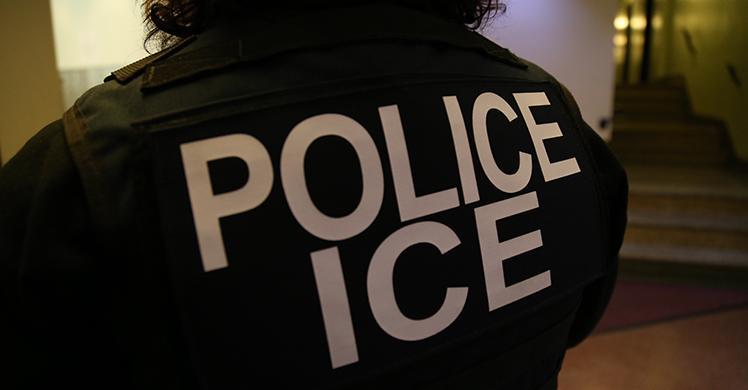latest
Charges dropped against Massachusetts judge who allegedly helped defendant evade ICE

By Chris Lisinski
STATE HOUSE, BOSTON, SEPT. 22, 2022…..Federal prosecutors will drop their charges against a Massachusetts judge accused of helping an undocumented immigrant evade federal immigration authorities in her courthouse, and she will instead go before a state judicial conduct panel, officials announced Thursday.
U.S. Attorney for Rhode Island Zachary Cunha said his office reached an agreement with Newton District Court Judge Shelley Richmond Joseph that will end the push for federal prosecution, which began during the Trump administration, and shift her case to a state-level review, a change that Cunha described as in “the interests of justice.”
Federal attorneys also filed to defer prosecution on a perjury charge against co-defendant Wesley MacGregor, a former court officer who allegedly worked with Joseph in 2018 to help a defendant exit the courthouse through a back door while an Immigration and Customs Enforcement officer waited by the building’s front door.
Cunha’s team filed a motion to dismiss the three obstruction of justice charges against both Joseph and MacGregor under the agreement.
“This case is about the conduct of a sitting state court judge, on the bench, in the course of her judicial duties. Its purpose has been to shed light on, and, as warranted, to secure accountability for that conduct,” Cunha said in a statement. “After I was assigned to oversee this matter, I undertook a full and comprehensive review of the evidence, the applicable law, and relevant equitable and prudential factors. Having done so, I have concluded that the interests of justice are best served by review of this matter before the body that oversees the conduct of Massachusetts state court judges, rather than in a continued federal criminal prosecution.”
As part of the agreement, Joseph on Thursday referred herself to the Massachusetts Commission on Judicial Conduct, which will make final recommendations about discipline to the Supreme Judicial Court, according to Cunha’s office. She also agreed to make factual admissions the panel will examine, in addition to the allegations included in the federal indictment and proceedings.
Cunha said the required self-referral and factual admissions will “ensure” Joseph’s judicial review takes place.
Former U.S. Attorney Andrew Lelling, who was appointed by former Republican President Donald Trump, charged Joseph and MacGregor in April 2019 with obstruction of justice. MacGregor also faced an additional perjury charge.
In the indictment, prosecutors alleged that Joseph presided over a hearing involving a man facing drug charges on April 2, 2018, where an ICE officer announced his presence to the court and his intent to arrest the defendant on an immigration detainer. The defendant had been deported twice before and had been prohibited from entering the U.S. until 2027, the indictment said.
The defendant had been arrested by Newton Police on March 30, 2018 and charged with narcotics possession and with being a fugitive from justice in Pennsylvania, federal prosecutors said in their indictment of Joseph and MacGregor. According to the Boston Globe, police found the defendant with a pill and two bags containing white powder they believed was cocaine, and state prosecutors on the day the defendant appeared before Judge Joseph dropped the fugitive charge after they determined the warrant from Pennsylvania was for a different man and they recommended releasing him without bail.
Joseph allegedly ordered the court clerk to ask the ICE officer to wait by the building’s front door. Prosecutors said she then turned off the courtroom’s audio recorder in violation of District Court rules and allowed MacGregor to escort the defendant, his attorney and an interpreter downstairs, where MacGregor released the defendant through a rear exit.
The SJC suspended Joseph without pay, and in August 2019 the state’s highest court reinstated her salary while keeping her suspended. The court order allowed Joseph to receive compensation and benefits due to her since her suspension began months earlier, but justices declined to fulfill her request to be reassigned to administrative duties while suspended.
Lelling resigned in February 2021, and President Joe Biden selected Rachael Rollins as the next top federal prosecutor in Massachusetts. Rollins was narrowly confirmed after debate on her criminal justice approach.
Rollins was recused from the Joseph case, saying a lawsuit she filed as Suffolk County District Attorney seeking to stop ICE from making courthouse arrests presented a potential conflict of interest. The Department of Justice assigned Cunha, a fellow Biden nominee who serves as U.S. attorney for Rhode Island, to take over the matter.
In March, U.S. Circuit Judge William Kayatta on behalf of a three-judge panel rejected a bid to dismiss the charges, writing that their appeals were “premature,” according to the Boston Globe.
The indictments of Joseph and MacGregor prompted intense scrutiny and debate, leading opponents of the prosecution to slam it as a federal overstep that was politically charged by debate over immigration policy.
Attorney General Maura Healey, who is now the Democratic nominee for governor, in 2019 called the indictment “a radical and politically-motivated attack on our state and the independence of our court.”
“It is a bedrock principle of our constitutional system that federal prosecutors should not recklessly interfere with the operation of state courts and their administration of justice,” Healey said at the time. “This matter could have been appropriately handled by the Commission on Judicial Conduct and the Trial Court. I am deeply disappointed by U.S. Attorney Andrew Lelling’s misuse of prosecutorial resources and the chilling effect his actions will have.”
Gov. Charlie Baker, who nominated Joseph to the District Court in 2017, defended the prosecution.
“I don’t think it was politically motivated,” Baker said in 2019. “I think there’s a big debate and a big discussion here about the role of state government and the role of local government and the role of federal government and how we handle these issues associated with detainers. I don’t think it was political.”
-

 Community7 years ago
Community7 years agoNational Shrine of La Salette Festival of Lights 2017 set to begin
-

 Community6 years ago
Community6 years agoMassachusetts State Police looking for good home for retired dogs
-

 Crime6 years ago
Crime6 years agoFall River ranked most dangerous city in Massachusetts according to report
-

 latest7 years ago
latest7 years agoDurfee student allegedly overdoses on marijuana
-

 Community6 years ago
Community6 years agoVideo of Fall River Police goes viral
-

 Causes6 years ago
Causes6 years agoMissing Fall River woman found deceased
-

 Crime6 years ago
Crime6 years agoFall River Police add names to most wanted list
-

 Causes6 years ago
Causes6 years agoFall River teenager reported missing has been found




